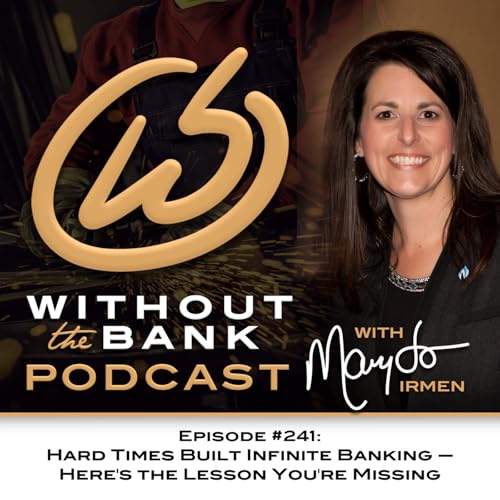
Hard Times Built Infinite Banking — Here's the Lesson You're Missing (Ep. 241)
Échec de l'ajout au panier.
Échec de l'ajout à la liste d'envies.
Échec de la suppression de la liste d’envies.
Échec du suivi du balado
Ne plus suivre le balado a échoué
-
Narrateur(s):
-
Auteur(s):
À propos de cet audio
Starting an IBC policy when everything feels worst? That's exactly how Nelson Nash discovered Infinite Banking, when bank rates hit 23% and leverage turned on him. Here's what he did, why it worked, and how to avoid the same traps.
👉 Follow Mary Jo Here: https://www.youtube.com/channel/UCXYvzroUouEMsTGKFw5nJHQ
👉 Get the book: https://www.withoutthebank.com/book/
We continue our study of Becoming Your Own Banker and unpack how the Infinite Banking Concept started.
Using Nelson's forestry analogy, we break down uninterrupted compounding, the dangers of overleveraging, why policy design matters (don't chase fast cash value if it weakens the system), and the flexibility of policy loans, especially in bad times.
We also address the costly mistake of canceling in Year 5, when policies typically begin to truly cash flow.
Key Takeaways:
◦ Plant the tree early: Compounding takes time; interrupting it sets you back years.
◦ Uninterrupted over interrupted compounding: Stop resetting the curve.
◦ Leverage cuts both ways: Gurus rarely explain when the lever flips.
◦ Policy loans = control: Flexible amortization; you set the payback schedule.
◦ Rates context: Banks at ~23% (early '80s) vs policy loans at ~5–8% in Nelson's story.
◦ Design matters: Don't chase extreme 10/90 if it risks MEC and weakens the base.
◦ Discipline wins: You're the banker—operate your system soundly.
◦ Don't quit in Year 5: Many cancel right before policies begin to outperform.
Chapters
00:00 Start when times aren't perfect (cold open)
00:50 Intro & setup—studying "How IBC Got Started"
01:11 Forestry analogy & (un)interrupted compounding
03:33 What interruption really costs you
04:28 Policy design tradeoffs (10/90, MEC risk, strong base)
05:07 The compounding curve: the most efficient year is the last
06:01 "Leverage your way to wealth"? What gurus don't say
06:57 Nelson's story: 8–9.5% to 23% prime shock ('81–'82)
08:46 Low-rate era behavior: overbuying & false confidence
10:19 Overpaying for homes/vehicles and today's price hangover
12:10 Leverage risk, HELOC callable, and bad timing
12:57 Risk mitigation vs assuming good times continue
13:25 "Find a fool?" Why selling in bad times fails
14:45 4 a.m. prayer & the realization: the money is in your policies
15:10 Policy loans at ~5–8% vs banks at 23%: why control matters
16:57 You set the amortization—flexibility in downturns
18:03 "How big a check?" = How much have you put in (premiums)
18:51 Revising spending: fund policies first, then attack debt
19:54 Start IBC in bad times, so you're skilled in good times
20:53 The Year 5 mistake: canceling right before cash flow
22:09 End of Life benefit = family protection while you bank
22:28 Discipline: be the banker or break your own bank
23:18 Wrap-up & next chapter invite
👍 Like this if you want more real-talk on IBC beyond the hype.
🔔 Subscribe & hit the bell to follow our chapter-by-chapter study.
💬 Questions about policy design, MEC, or using loans? Drop them in the comments.
📚 Studying along? Bring your copy of Becoming Your Own Banker to the next episode.
Link Mentioned:
Becoming Your Own Banker — R. Nelson Nash
https://www.withoutthebank.com/product/becoming-your-own-banker


